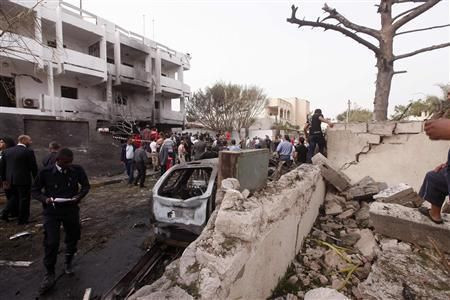
Two French guards were wounded in the Libyan capital of Tripoli today when a car bomb detonated outside the French embassy. Libyan Foreign Minister Mohammed Abdel Aziz and French Foreign Minister Laurent Fabius both called the event "a terrorist act".
The explosion took place this morning at around 7 a.m. EST in the Hay Andalus neighborhood of Tripoli, close to the Mediterranean seafront. A large part of the wall around the compound collapsed in the blast. Reuters wrote that office cabinets were scattered on the ground and water gushed from a burst pipe, and that the blast had blown apart nearby cars.
The New York Times interviewed a resident living nearby who wished to remain anonymous for fear of reprisals. The resident compared the explosion to the worst days of violence in Iraq, saying, "I was knocked out of bed. I lived in Baghdad and I woke up to explosions as big as this one."
Reuters quoted one Western diplomat who said that it was "a very worrying sign for the government" and added that it would be a deterrent for foreign investment in the Libyan economy.
Since the toppling of Muammar Gaddafi's government in 2011, Prime Minister Ali Zidan and his defense and interior ministers has been trying to get militias who fought against Gaddafi to lay down their arms. But the government also depends heavily on certain powerful militias for security, deeming them legitimate and others illegitimate. Some of the militias are known to act with impunity, making arrests, running their own prison cells and enjoying state salaries without state oversight. The country has no unified army.
No group claimed responsibility for the attack on the embassy, but some say that it may be related to France's military intervention in Mali. Westerners in the region have been nervous since militants took hostages at the In Amenas natural gas plant in Algeria near the Libyan and Malian frontiers. The militants demanded that Paris cease their military operations in Mali.
In September of this year, four Americans -- including U.S. Ambassador Christopher Stevens -- were killed at Washington's mission in Benghazi, the hub of Libya's oil industry. According to the New York Times, U.S. officials believe militants with al-Qaeda ties were responsible or involved in the attack, but no group who has claimed responsibility is believed to be the actual culprit. Seven months after the ambassador's death and after President Obama called for justice to be done there, little progress has been made in identifying and apprehending those responsible.
Reuters wrote that British, United Nations and Red Cross missions in Eastern Libya have also been targets of recent violence.
© 2025 Latin Times. All rights reserved. Do not reproduce without permission.




